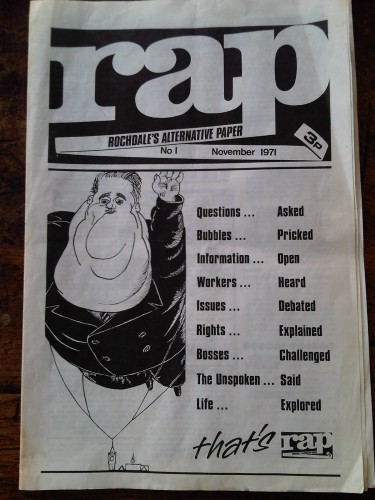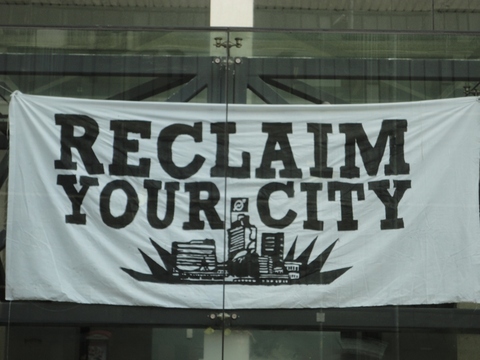Alternative journalism: asking the awkward questions
Article published: Sunday, December 21st 2014
Journalism lecturer Tony Harcup specialises in researching alternative media. Interviews with some of the former MULE editors were included in his book Alternative Journalism, Alternative Voices. He has now published an academic article about MULE as a classic example of oppositional reporting and specially rewrote it for MULE.
Since its launch in 2007 MULE has offered a welcome alternative to celebrity-obsessed mainstream journalism while managing to avoid the shouty propaganda found in rather too many radical outlets. That’s because it goes beyond gossip, comment and opinion to engage in some actual reporting, using journalistic skills to discover things that might otherwise be ignored or downplayed.
MULE can be thought of as a sort of 21st century equivalent of the local alternative newspapers that sprang up in the 1970s: Manchester Free Press, Rochdale Alternative Paper, Bury Metro News, Liverpool Free Press, Leeds Other Paper and all the rest. Just as, in their day, such titles were simply the latest examples of an alternative publishing tradition dating back to the 19th-century Chartist Northern Star and even earlier.
In their different ways these and countless other variations on alternative media share a commitment to looking at society from the bottom up, not the top down. They ask some of the awkward questions, because somebody has to.
The results of a research project examining exactly how MULE goes about doing this are published in the December 2014 issue of Communication, Culture & Critique, published by the International Communication Association (ICA). For the benefit of anybody without access to a library that subscribes to such academic journals, some of the main findings are set out here.
A month in Manchester
MULE output was analysed to see the full range of stories published in a randomly selected month, noting the topics covered, the sources quoted, and what extra information was given to encourage people to join in events or campaigns (such as contact details or the date, time and venue of upcoming activities). During the month in question MULE published 25 items, 17 of which could be called news stories. The others were four previews of events, three feature articles and one review.
This material was overwhelmingly political, in the non-party sense, and local: it mostly dealt with issues such as spending cuts, tuition fees, climate change and human rights, all as they affect people in Manchester. The single review also fitted this description as it was of a series of political films screened at a Spanish and Latin American festival in the city.
There were a total of 110 identifiable sources of information referred to in these 25 pieces, ranging from just one source in some stories up to double figures in four cases. On average (whether median or mean) each item mentioned around four sources. That might not seem like an awful lot but it compares favourably when considered alongside studies that suggest an alarming number of stories in the mainstream local media quote just one or two sources. Glance at the output of local commercial newspapers and their websites to see for yourself, especially in these days of office closures and ludicrously understaffed newsrooms.
MULE used a range of sources over the month, including:
* 31 campaign activists or campaign groups;
* 13 mainstream media outlets;
* 9 official reports or representatives;
* 8 alternative media outlets;
* 7 individuals not identified as activists;
* 7 cultural groups.
The rest were made up mostly of trade union representatives, charities, community organisations, asylum seekers, youth workers and even the odd academic researcher. The study showed that, despite not having a team of paid reporters, MULE used multiple sources for three-quarters of its stories, giving space to a range of campaigning and critical voices alongside evidence drawn from official and mainstream sources.
That wasn’t all. The 25 published items also included 53 links to other websites, 12 details of upcoming events, and 10 sets of contact details for the campaigns or other organisations covered in its stories. Stories seemed to be included not just because they were interesting and/or important but also because they were a means to an end: that end being to encourage readers to participate in the life of the city, even to take action for social change.
The study found that what MULE does is certainly recognisable as journalism, albeit journalism informed by an alternative view of the world. Its depth and breadth at its best goes well beyond much of what can be found in mainstream media, particularly at a local or regional level. So MULE can be seen as a classic contemporary example of what leading scholars such as Chris Atton in Scotland and Susan Forde in Australia celebrate as ‘alternative journalism’.
But journalism – even of the alternative variety – is still a fairly broad label. What interests some of us most about MULE is its commitment more specifically to reporting: that is, discovering, sourcing, verifying and analysing fresh information on topical events and then communicating the results in an easy-to-read style.
Oppositional reporting
The purpose of such journalism, which I label ‘oppositional reporting’, is to challenge the powerful and to seek out the voices of those people struggling in one way or another to take more control over their own lives. At the risk of making it sound more complicated or pretentious than it is, the best of MULE-style oppositional reporting could be said to involve a mixture of:
• Speaking up for the interests of labour against capital; for working class communities against corporations and bureaucrats; for the concept of social need as opposed to individual greed; for human rights and freedom from oppression, repression, discrimination, sexism and racism.
• The use of routine journalistic practice to discover, verify, analyse and communicate new information about topical events of importance to citizens.

The Rochdale Alternative Press firstly published child abuse allegations against Lib Dem MP Cyril Smith in 1979.
• The use of multiple sources to uncover, check, question and evaluate evidence.
• The production of journalism that declares its bias openly.
• The recording of the voices of those directly involved in events, allowing them to speak for themselves as active agents rather than passive victims.
• The production of ‘counter-hegemonic’ journalism that critiques how society is ruled and how issues tend to be reported in mainstream media.
• The use of all of the above to encourage ‘ordinary people’ to become active participants in the public, social, civic, cultural, political and media spheres.
True, not every story features many voices of ‘ordinary people’ (whoever they or we might be), but at least there is a commitment to making such voices heard rather than ignoring them. If more readers joined in researching and writing MULE stories, or maybe offered multimedia skills such as audio and video, then even more such voices could be heard asking questions and making points that rarely make the cut in mainstream coverage.
Isn’t that more or less much what alternative media have always been about, in their many and varied ways? This site’s own statement puts it like this:
‘MULE is a Manchester based non-profit independent media project, looking to promote social justice by getting out the news and views you won’t find elsewhere, from the rainy city and beyond! Three core principles underlie our work:
1) Providing an alternative has never been more important. Traditional local media is facing hard times. Budget cuts and the turn away from serious reporting means there’s an information vacuum waiting to be filled in our communities. On a wider level, the commercial media system is dominated by a small number of huge corporations and wealthy individuals. This system promotes commercial values, and filters out information not conducive to the immediate bottom line or long-run corporate interests. Mule aims to cover the burning issues that the mainstream media neglect, without screaming down peoples necks, being boring or preachy, or speaking to a select, in-the-know audience.
2) Media as a tool for social change. At its best independent media supports progressive social movements by raising public awareness and providing information that is a tool in the hands of campaigners. This starts at home. The place we can be most effective is in our backyard, holding power to account in Manchester.
3) Openness and inclusivity. From the start, MULE has been an organisation run primarily by volunteers. We want to provide an opportunity for writers, designers, web geeks and volunteers of all varieties, to get involved and share or improve their skills.’
If that sounds like something to which you could contribute somehow, then you would be helping to continue a tradition of alternative journalism and ‘holding power to account’ stretching back to the Suffragettes, the Chartists and beyond.
The month in which all MULE output was analysed was March 2012 – yes, academic publishing can be ridiculously slow. Since then some individuals have moved away, others have joined the group that produces MULE, and there have been one or two periods of hibernation during which not much new content has been put online.
But MULE is still online as an example of alternative media as ‘a tool for social change’, and the opportunity is there for new people to get involved. What are you waiting for?
Tony Harcup
Tony Harcup teaches journalism at the University of Sheffield and is author of Alternative Journalism, Alternative Voices (Routledge, 2013). His research article about MULE, ‘News with a kick: a model of oppositional reporting’, can be found in Communication, Culture & Critique Volume 7, Number 4.
If you want to write for MULE, email editor@themule.info for more details.
More: Local journalism, Manchester, News
Comments
No comments found
The comments are closed.




